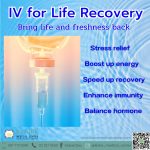Long term effects of Covid-19 infection
Some people who have COVID-19 infection may continue to experience symptoms after their initial recovery. The disease can cause cytokine storms end up damages major organs such as heart, lungs, and brain. This organ damages may increase the risk of long-term health problems.
Elderly and people with some medical conditions are most likely to experience lingering COVID-19 symptoms, but even young and healthy people could have post-COVID-19 symptoms for weeks to months. The causes of Long Covid syndrome could be due to organ damage, a persistent inflammatory or autoimmune response or other causes such as overstress during Covid treatment.
-
- Affected organs may include :
-
- – Lungs: damages to the tiny air sacs in the lungs (alveoli) result in scar tissue. This can lead to long-term breathing problems such as persistent shortness of breath, tiredness, and chronic cough with or without chest pain.
-
- – Brain and nervous system : As Covid-19 infection causes blot clotting, disrupting blood supply that cause lack of oxygenation in brain cells. These can cause following symptoms: poor memory, brain fog, insomnia, seizure, stroke, dizziness, headache, depression and anxiety. It may also increase the risk of developing Parkinson’s and Alzheimer’s disease.
-
- – Heart: Some damages to the heart muscle could lead to the symptoms of palpitations, arrhythmia and may increase the risk of heart failure in the future.
-
- – Immune system: Consequences of infection cause persistent abnormalities in immune cells and disrupt body’s inflammatory response. This could lead to the symptoms of muscle and joint pain and may cause autoimmune diseases.
-
- – Blood circulation: Covid infection can cause blood clots and effect major organs such as heart, brain, liver and kidneys. The infection can also weaken blood vessels wall and cause bleeding which potentially leads to long-lasting problems to the body.
-
- – Other symptoms : fatigue, intermittent fever, anosmia and dysgeusia.
-
- ? Created by Patsri Chuepool, M.D., ABAARM, WOSAAM
-
- ?Information credit :









